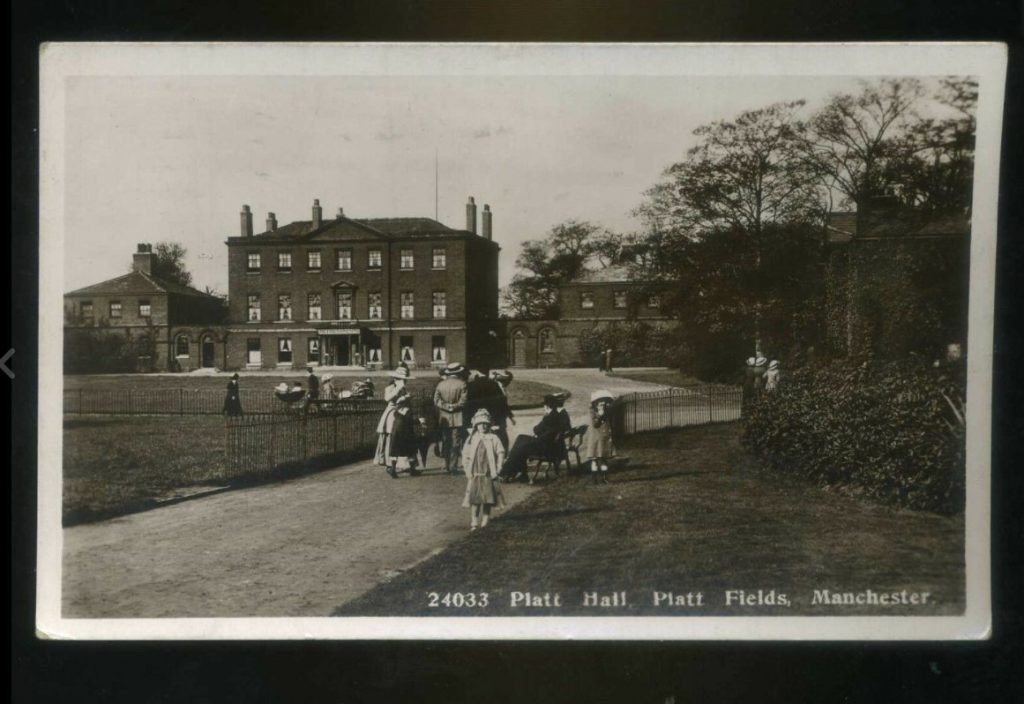
Platt Pack: Creative Activities and Digital Trail for Active Participation and Community Engagement in Platt Fields Park
Postcards from Platt Fields – a creative engagement project
The dramatic and universal changes to public life caused by the global coronavirus pandemic have shone a spotlight on a previously unsung hero, the urban park. As restrictions on our behaviour, freedom of movement and social contact have radically altered over these past 18 months, the municipal public park has demonstrated its valued role in community and everyday life as a vital counterbalance to the impact of the pandemic on the nation’s health and wellbeing.
The “Platt Pack” project was set up to celebrate and promote this role, using digital storytelling and the creation of community resources on histories and activities of local community groups in Platt Fields, the large park in South Manchester, at the heart of Fallowfields, Rusholme and Moss Side.
Our objectives for the project were to:
- Provide the basis for the development of a digital archive held by the Platt Fields on behalf of the park, led by the Friends of Platt Fields.
- Deliver a digital and physical resource pack, the ‘Platt Pack’ to promote family friendly active participation through health walks and creative engagement in outdoor spaces, nature environments and historical collections.
- Offer placement opportunities for University of Manchester Masters students in archive development, digital marketing and community curating
- Develop a community-curated exhibition in Platt Fields that will feature in the windows of Platt Fields and through digital projection in outdoor spaces around the park to offer a Covid safe engaging experience.
- Promote these activities through a variety of social media channels brought together in the project, including Creative Manchester.
The idea for the project drew on previous research and engagement activities prior to and during the first and second pandemic lockdowns by Abi Gilmore, which connected together different user communities and ongoing initiatives based in Platt Fields. These included: community consultation and collections-led engagement, led by Platt Hall/Manchester Art Gallery; volunteering in park stewardship and maintenance, by Platt Fields Friends Group; community allotments, environmental sustainability and education, by Platt Fields Community Garden; public realm artistic and curatorial practice, Terrace Square Artists Project; and social justice and anti-racism campaigning led by the local Black Lives Matter group.
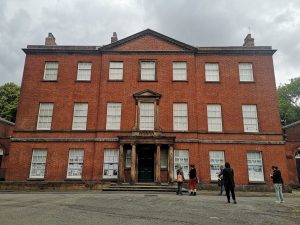
Platt Hall in Platt Fields park. Its windows are being used as community displays whilst the museum is closed.
Working closely with the Manchester City Council Parks team, Manchester Art Gallery and the voluntary group Friends of Platt Fields, we created a new digital trail using the Love Exploring app, a geo-locative engagement tool licensed by Manchester City Council parks team which can host creative content such as video, audio, images and text, as well as augmented reality ‘objects’.
The new trail called “Postcards from the Past” builds on an existing trail “Platt Hall Treasures” which was created during the first lockdown in 2020 as part of the Platt Hall In Between programme. Both trails encourage users of the app to walk around the park using smart devices to encounter local stories and virtual objects based in the Platt Hall collections, and information on community websites and social media. Sprytar, the developers of Love Exploring were generous with their time, advice and access to the app, which has the capacity to track active engagement and promote healthy lifestyles for family friendly audiences.
We commissioned Our Stories heritage consultancy to help with the on- and off-line curation and interpretation of the exhibition and Love Exploring trail, which focuses on 6 different sites and related activities in the park. Using the lens of “Postcards from the Past”, we have employed images from antique postcards around Platt park to encourage participants to look at the same views in Platt Fields today and enjoy the sights and sounds with fresh eyes and ears. The interpretation provides historical insights into the ways people in Manchester used and looked after the park in the past, and offers suggestions for how to get involved in volunteering. We have also created family friendly creative activities, using images from Platt Hall’s collections and the Friends of Platt Fields archive on downloadable sheets (which will also be distributed as printed copies at community events).
The work was conducted by a team that included Richard Stout, the chair of the Friends group, Liz Mitchell, the lead curator at Platt Hall and Ruth Colton, Our Stories, plus Yuxi Wang and Yun Xiong, MA Arts Management, Policy and Practice placement students. The project was managed by Abi Gilmore. We consulted closely with members of the Manchester City Council parks team, Love Exploring, the Learning and Engagement team at Platt Hall, the Friends group and associated community groups including the Manchester Urban Diggers (MUD) who run the Platt Fields Market Garden and have recently become involved in a collaboration with Platt Hall on their new Garden project.
Working remotely during the third England lockdown was challenging, not least for Yun and Yuxi, our international students, who were less familiar with English parks and local communities, but who made brilliant work of archival research and the development of content and social media plans. Organising Zoom meetings around people’s working lives to fit in with freelancer and volunteer roles was also challenging, especially when we all just wanted to be either out in the open in the park or the museum enjoying its shelter and its collections.
The biggest challenge was ensuring that we were sensitive to the many, many different constituent users of Platt Fields and that the creative content that we developed could communicate positive messages promoting activities that engage people safely with maximum inclusion and benefit. We were mindful, through reports on social media, that park rangers were dealing with errant rappers (when AJ Tracey made an illegal PA back in April) and littering and antisocial behaviour from students and other Platt Fields users, as parks continued to offer the main cultural spaces in the city, particularly when the sun was shining.
As restrictions have eased, the park has returned to its more natural beauty, helped by the brilliant volunteers who look after its many gardens, its orchard, playgrounds and sports facilities, and participants who take part in their everyday activities with respect for others. The window exhibition will be up in Platt Hall for the summer and the Postcards from the Past trail is on Love Exploring app. The new pages on the Friends of Platt Fields website host the activity sheets and interpretation, augmented by participation through social media, and providing the basis for a new digital archive.
We hope these resources provide small windows onto Platt Fields past, but more importantly act as portals to its future by creating engagement and care from fellow park lovers for humble but essential urban park.
Project duration: January – July 2021
Project lead: Dr Abi Gilmore (Dept. of Art History and Cultural Practices, UoM)
Internal Partner: Creative Manchester
External Partners: Friends of Platt Fields, Manchester Art Gallery, Manchester City Council Parks Team
Audiences involved: Policy makers, voluntary community groups, museums professionals, postgraduate students, general public
Audience feedback:
“That’s so brilliant! I walk past here all the time and hadn’t noticed that there are things going on until I saw the windows. Can I have a look at the Garden project?”
visitor seeing the exhibition being installed in Platt Hall windows, July 2021
Funding source: SALC and Creative Manchester Cultural Engagement Award

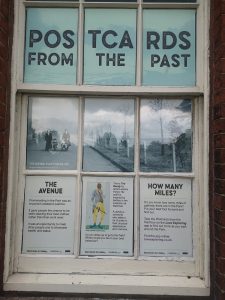
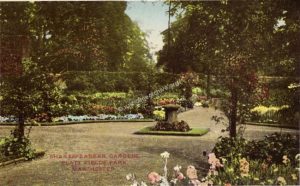
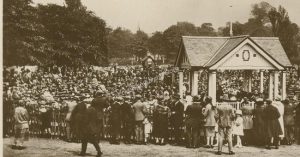
0 Comments